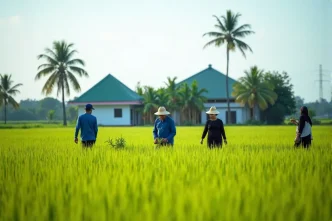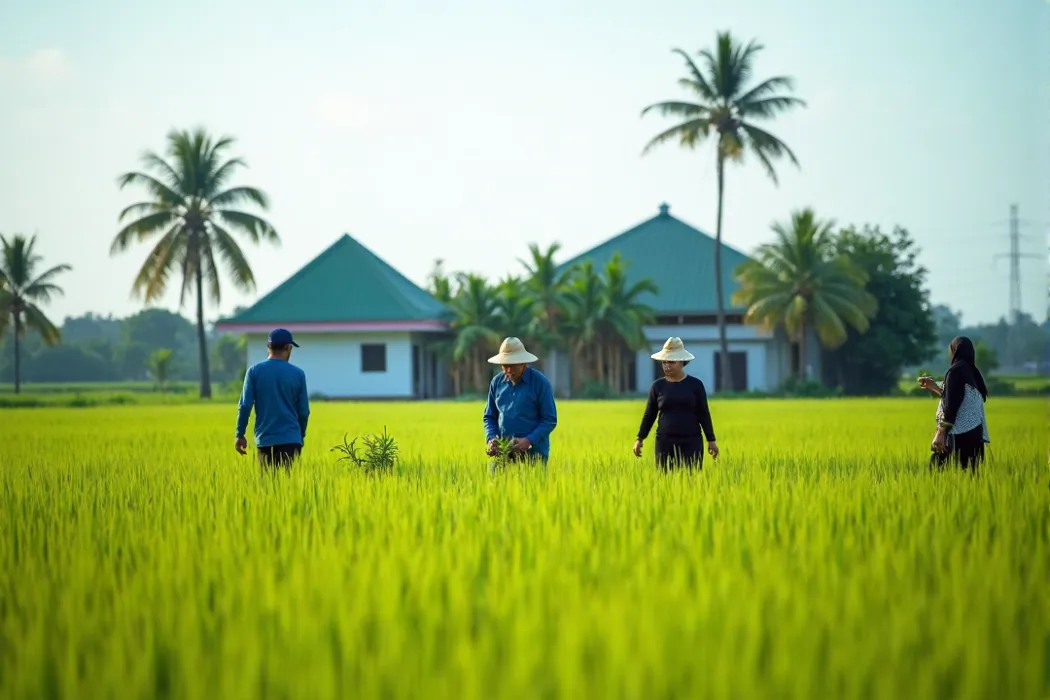Kuala Lumpur – Malaysia, a nation long celebrated for its rich agricultural heritage and diverse cuisine, faces a growing threat to its food security. Rising costs, climate change, and dependency on imports have exposed vulnerabilities in the country’s food supply chain, raising alarms among policymakers, farmers, and consumers alike. As global challenges mount, experts warn that without urgent action, Malaysia risks deeper economic and social fallout from this escalating crisis.
Import Dependency and Rising Costs
Malaysia’s reliance on imported food has become a critical weak point in its economy. Despite being a major producer of palm oil and tropical fruits, the country imports nearly 60% of its rice, a staple for millions of households, as well as significant portions of vegetables, meat, and dairy. This dependency leaves Malaysia exposed to global price fluctuations and supply chain disruptions, as seen during the COVID-19 pandemic when border closures delayed shipments and drove up costs.
Recent data from the Department of Statistics Malaysia highlights the severity of the issue. In 2023, food inflation reached a five-year high, with prices for essentials like rice and poultry climbing by over 8% compared to the previous year. For many low-income families, these increases are unsustainable. “We’re spending almost half our income on food now” said Noraini Hassan, a single mother of three from a Kuala Lumpur suburb. “Even local vegetables are becoming a luxury.”
The situation is compounded by Malaysia’s currency fluctuations. The ringgit’s depreciation against the US dollar has made imports even costlier, with the price of goods like wheat—used for bread and noodles—soaring. A recent report by the Ministry of Agriculture and Food Industries noted that the cost of importing 1,000 metric tons of wheat rose from 1.2 million ringgit (US$255,000) in 2021 to nearly 1.5 million ringgit (US$319,000) in 2024, reflecting both currency challenges and global supply constraints.
Climate Change: A Threat to Local Production
Beyond economic pressures, climate change poses a direct threat to Malaysia’s agricultural output. Erratic weather patterns, including prolonged droughts and severe flooding, have disrupted crop yields in key regions like the rice-growing areas of Kedah and Penang. In 2023, floods in the northern states destroyed thousands of hectares of farmland, slashing rice production by an estimated 15%, according to the Malaysian Agricultural Research and Development Institute.
Smallholder farmers, who form the backbone of Malaysia’s agricultural sector, are particularly vulnerable. Many lack the resources to adapt to changing conditions, such as investing in drought-resistant seeds or modern irrigation systems. “The weather is unpredictable now” said Ahmad Razali, a rice farmer from Perak. “One year we have too much rain, the next year too little. We can’t keep up.”
Climate change also affects Malaysia’s fisheries, a vital source of protein for the population. Rising sea temperatures and overfishing have depleted fish stocks along the country’s coasts, especially in the South China Sea. Fishermen in coastal areas like Johor report declining catches, with some species disappearing entirely from local waters. This not only threatens livelihoods but also drives up the price of seafood, a dietary staple for many Malaysians.
Government Response and Policy Gaps
Recognizing the urgency of the situation, the Malaysian government has introduced several initiatives to bolster food security. The National Food Security Policy Action Plan 2021-2025 aims to increase local production of rice, vegetables, and livestock while reducing reliance on imports. Key measures include subsidies for farmers, investments in agricultural technology, and campaigns to encourage urban farming in cities like Kuala Lumpur and Penang.
However, critics argue that these efforts fall short of addressing systemic issues. Agricultural economist Dr. Lim Wei Ling from Universiti Malaya points out that subsidies often fail to reach smallholder farmers due to bureaucratic inefficiencies and lack of outreach. “The policies look good on paper, but implementation is another story” she said. “Many farmers are still struggling to access the support they need.”
Moreover, land use conflicts pose a significant barrier to expanding agricultural production. Rapid urbanization and industrial development have encroached on fertile farmland, particularly in states like Selangor and Johor. Environmental groups have also raised concerns about deforestation linked to palm oil plantations, which often prioritize export revenue over local food needs. Balancing these competing interests remains a formidable challenge for policymakers.
Regional and Global Implications
Malaysia’s food security crisis is not an isolated issue; it reflects broader regional and global trends. Neighboring countries like Thailand and Indonesia, both major agricultural exporters, face similar pressures from climate change and rising demand. Thailand, a leading rice exporter, has seen its output decline due to drought, indirectly affecting Malaysia’s supply. Meanwhile, global events—such as the war in Ukraine, which disrupted wheat and fertilizer exports—have ripple effects on food prices across Southeast Asia.
Experts warn that without regional cooperation, individual nations will struggle to address these interconnected challenges. “Food security is a shared problem” said Dr. Siti Aminah, a policy analyst based in Kuala Lumpur. “Malaysia needs to work with ASEAN partners to build resilient supply chains and share technology for sustainable farming.”
At the global level, Malaysia’s situation underscores the fragility of food systems in middle-income countries. While not facing the acute hunger crises seen in parts of Africa or South Asia, Malaysia’s dependence on imports and vulnerability to climate shocks highlight the need for long-term strategies. International organizations like the Food and Agriculture Organization (FAO) have called for greater investment in climate-smart agriculture and trade diversification to mitigate such risks.
Public Sentiment and Social Impact
As food prices climb, public frustration is growing. Social media platforms reveal widespread discontent among Malaysians, with many blaming government inaction for the crisis. Posts on X from users in urban centers like Kuala Lumpur and Georgetown frequently highlight the struggle to afford basic groceries, with hashtags like #FoodCrisisMY gaining traction. While these sentiments reflect genuine hardship, they also underscore the political stakes for the government as elections approach.
The social impact extends beyond economics. Rising food costs disproportionately affect marginalized communities, including rural farmers, indigenous groups in East Malaysia, and urban poor families. Nutritionists warn that sustained price hikes could lead to increased malnutrition, particularly among children, as families cut back on protein-rich foods like meat and fish in favor of cheaper, less nutritious options.
Looking Ahead: Solutions and Challenges
Addressing Malaysia’s food security crisis requires a multi-pronged approach. Experts advocate for greater investment in sustainable farming practices, such as precision agriculture and vertical farming, which could boost yields while conserving resources. Public-private partnerships could also play a role in scaling up local production and reducing import dependency.
Equally important is the need for public awareness. Campaigns to reduce food waste—Malaysia discards an estimated 17,000 tons of food daily, according to the Solid Waste Management and Public Cleansing Corporation—could help stretch limited resources. Encouraging dietary shifts, such as consuming more locally grown crops, might also ease pressure on imported goods.
Yet, the road ahead is fraught with obstacles. Political will, funding, and coordination between federal and state governments will be crucial to turning policy into action. As global uncertainties persist, from geopolitical tensions to climate disasters, Malaysia must act swiftly to safeguard its food supply.
For now, the nation stands at a crossroads. With each passing month, the strain on farmers, families, and the economy grows. Whether Malaysia can transform this crisis into an opportunity for resilience remains an open question, one that will shape the future for millions across the country.
















